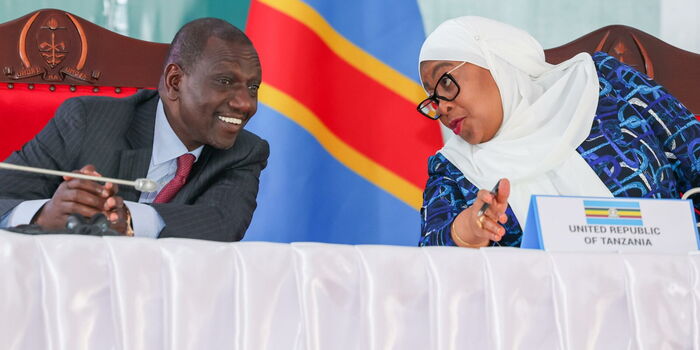Ruto Skips Swearing-in of President Suluhu
President William Ruto has not attended the official swearing-in ceremony of Tanzanian President Samia Suluhu Hassan, which is taking place in Dodoma, Tanzania. Instead of traveling to Dodoma himself, President Ruto delegated the responsibility to Deputy President Kithure Kindiki, who is representing Kenya at the high-profile event.
The inauguration comes after a tense and disputed presidential election held on October 29. Earlier in the day, President Ruto sent his congratulations to President Suluhu following her victory, which was officially confirmed by the Tanzanian election commission a few days ago.
Across the continent, several African leaders have also chosen to send representatives rather than attend the ceremony in person. Uganda’s President Yoweri Museveni is among those who skipped the event, opting to dispatch a delegation on his behalf.
This has made the presence of East African Community (EAC) heads of state at the inauguration notably low.
However, not all leaders stayed away. Somalia’s President Hassan Sheikh Mohamud, the newest member of the EAC, attended in person, showing solidarity with Tanzania’s leadership.
Other notable figures present include Zambia’s President Hakainde Hichilema and Mozambique’s President Daniel Chapo, who both joined the select group of regional leaders witnessing the ceremony.
President Samia Suluhu, who secured a landslide victory with more than 97 percent of the vote, is no stranger to Tanzanian politics. She first became President on March 19, 2021, following the sudden death of her predecessor, John Pombe Magufuli, whom she had served under as Vice President since 2015.
Despite her historic win as Tanzania’s first female President, Suluhu’s leadership and the recent election have been surrounded by controversy. As the country gears up for the 2025 General Elections, criticism has mounted over her administration’s handling of opposition leaders.
In April, Tundu Lissu, leader of the opposition CHADEMA party, was arrested and charged with treason after leading a rally that demanded electoral reforms. Around the same period, Luhaga Mpina of the ACT-Wazalendo party, which is Tanzania’s second-largest opposition group, was barred from contesting in the election.
The October 29 polls were marked by tension and unrest. Reports indicate that thousands of citizens took to the streets to demonstrate against what they described as a rigged and unfair election process. Unfortunately, the protests turned deadly, with at least 500 people reported to have lost their lives in the chaos.
Due to the growing unrest, the Tanzanian government decided to hold the inauguration ceremony in a highly restricted environment. The event is taking place within a secured military parade ground in Dodoma, away from the public eye, with only selected guests and dignitaries allowed to attend.
Meanwhile, Tanzania remains in a state of deep uncertainty. Following the election, the government imposed a widespread media blackout that has silenced most communication platforms.
Electricity and internet access have been severely limited, while several local and international media outlets have been blocked from broadcasting.
The situation has further been compounded by reports of worsening shortages in essential supplies such as fuel and food, sparking growing frustration among Tanzanian citizens.
Many are now calling for an end to the information blackout and for international attention to be directed toward the deteriorating situation in the country.
President Suluhu’s new term begins under heavy scrutiny, both domestically and internationally, as she faces pressure to restore public trust, stabilize the nation, and rebuild Tanzania’s democratic image following one of the most contentious elections in its recent history.
Join Government Official WhatsApp Channel To Stay Updated On time
https://whatsapp.com/channel/0029VaWT5gSGufImU8R0DO30


